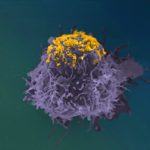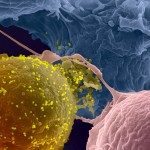Lien vers Pubmed [PMID] – 38373599
Lien DOI – 10.1016/j.virusres.2024.199338
Virus Res 2024 Apr; 342(): 199338
The role of aichivirus A1 (AiV-A1) in acute gastroenteritis remains controversial and in vitro data illustrating its pathogenesis in suitable human models are scarce. Here, we demonstrate that AiV-A1 isolate A846/88 replicates in ApoA1- (absorptive) and Ki-67-positive (proliferative) enterocytes in stem cell-derived human small intestinal epithelium (HIE) as well as in patient biopsy samples, but not in any of the tested human cell lines. The infection did not result in tissue damage and did not trigger type I and type III interferon (IFN) signalling, whereas the control, human coxsackievirus B3 (strain Nancy), triggered both IFNs. To investigate the tissue tropism, we infected a human tracheal/bronchial epithelium model (HTBE) with AiV-A1 isolates A846/88 and kvgh99012632/2010 and, as a control, with rhinovirus A2 (RV-A2). AiV-A1 isolate kvgh99012632/2010, but not isolate A846/88, replicated in HTBE and induced type III IFN and ISGs signalling. By using various pharmacological inhibitors, we elaborated that cellular entry of AiV-A1 depends on clathrin, dynamin, and lipid rafts and is strongly reliant on endosome acidification. Viral particles co-localised with Rab5a-positive endosomes and promoted leakage of endosomal content. Our data shed light on the early events of AiV-A1 infection and reveal that different isolates exhibit distinct tissue tropism. This supports its clinical importance as a human pathogen with the potential to evolve toward broader tissue specificity.


